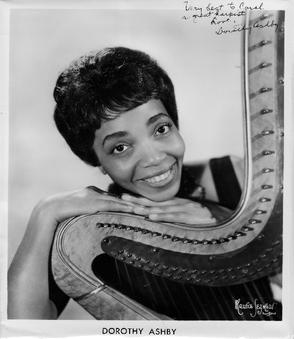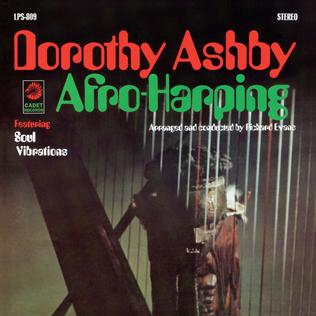
Frank Wellington Wess was an American jazz saxophonist and flutist. In addition to his extensive solo work, Wess is remembered for his time in Count Basie's band from the early 1950s into the 1960s. Critic Scott Yanow described him as one of the premier proteges of Lester Young, and a leading jazz flutist of his era—using the latter instrument to bring new colors to Basie's music.

Dorothy Jeanne Thompson, better known as Dorothy Ashby, was an American jazz harpist, singer and composer. Hailed as one of the most "unjustly under loved jazz greats of the 1950s" and the "most accomplished modern jazz harpist," Ashby established the harp as an improvising jazz instrument, beyond earlier use as a novelty or background orchestral instrument, proving the harp could play bebop as adeptly as the instruments commonly associated with jazz, such as the saxophone or piano.
Eddie Jones was an American jazz double bassist.
Wendell Marshall was an American jazz double-bassist.

The Greatest!! Count Basie Plays, Joe Williams Sings Standards is an album by vocalist Joe Williams and pianist/bandleader Count Basie and His Orchestra recorded in 1956 and released on the Verve label. It was Williams' second album with Basie following Count Basie Swings, Joe Williams Sings.

Loads of Love is a 1963 jazz studio album by Shirley Horn, arranged by Jimmy Jones. Prestigious musicians collaborated on the album, including Gerry Mulligan, Kenny Burrell, Al Cohn, and Hank Jones.

Elvin! is a jazz album by drummer Elvin Jones recorded in 1961 and 1962 and released on the Riverside label. It features Jones playing in a group with his brothers, trumpeter Thad and pianist Hank, along with tenor saxophonist Frank Foster, flautist Frank Wess and bassist Art Davis.

Velvet Soul is an album by saxophonist Gene Ammons compiling sessions recorded between 1960 and 1962 and released on the Prestige label in 1964.

Angel Eyes is an album by saxophonist Gene Ammons compiling sessions recorded in 1960 and 1962 and released on the Prestige label in 1965.

Hip Harp is an album by jazz harpist Dorothy Ashby recorded in 1958 and released on the Prestige label.

In a Minor Groove is an album by jazz harpist Dorothy Ashby recorded in 1958 and released on the New Jazz label.

Afro-Harping is an album by jazz harpist Dorothy Ashby recorded in 1968 and released on the Cadet label.

The Rubaiyat of Dorothy Ashby is an album by jazz harpist Dorothy Ashby recorded in late 1969 and early 1970 and released on the Cadet label. On this album, Ashby plays the Japanese musical instrument, the koto, demonstrating her abilities to successfully integrate another instrument into jazz.

Southern Comfort is an album by jazz saxophonist Frank Wess which was recorded in 1962 and released on the Prestige label.

On the Sunny Side is an album by American jazz tenor saxophonist Paul Quinichette featuring tracks recorded in May 1957 and released on the Prestige label.

The Chase Is On is an album by saxophonists Charlie Rouse and Paul Quinichette recorded in 1957 and released on the Bethlehem label.

Flute Suite is an album by American jazz composer and arranger A. K. Salim featuring flautists Frank Wess and Herbie Mann recorded in 1957 for the Savoy label.

Flutes & Reeds is an album by American jazz saxophonist/composer/arranger Ernie Wilkins and saxophonist/flautist Frank Wess featuring performances recorded in 1955 and first released on the Savoy label. The Shown cover art is from the 1970s Savoy Jazz re-issue.

Dorothy's Harp is a studio album by jazz harpist Dorothy Ashby released in 1969 via the Cadet label. A few years after releasing Dorothy’s Harp, she started working with Stevie Wonder. The record includes two Brazilian-touched compositions: "Reza" and "Canto de Ossanha". The album was re-released as a CD in 2006.

Django/Misty is a studio album by jazz harpist Dorothy Ashby released via the Philips Records label in 1984. The album is named after two famous jazz compositions.


















